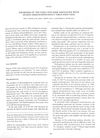Search
for
Sort by
Research
840-870 / 1000+ resultsresearch Reply to: Comment on Bicalutamide Improves Minoxidil-Induced Hypertrichosis in Female Pattern Hair Loss: A Retrospective Review of 35 Patients

research Minoxidil
Minoxidil controls blood pressure effectively, but may cause side effects like hypertrichosis.

research Safety of Low-Dose Oral Minoxidil for Hair Loss: A Multicenter Study of 1404 Patients
Low-dose oral minoxidil safely treats hair loss, with hypertrichosis as main side effect.

research Low-Dose Oral Minoxidil as Treatment for Non-Scarring Alopecia: A Systematic Review
Low-dose oral minoxidil effectively treats non-scarring hair loss with some side effects like hypertrichosis and postural hypotension.

research Adverse Effects of Low-Dose Oral Minoxidil for Androgenetic Alopecia in 435 Patients
Low-dose oral minoxidil may cause side effects like hypertrichosis and is not suitable for everyone.

research Drug-Induced Hair Loss and Hair Growth
Some drugs can cause hair loss or increase hair growth, but these effects are usually reversible when the drug is stopped.

research Evidence-Based Guideline for the Treatment of Androgenetic Alopecia in Women and Men – Short Version
Use minoxidil for hair loss treatment; assess results after 6 months.

research Principles of Hair Cycle Control
Manipulating the catagen and telogen phases of hair growth could lead to treatments for hair disorders.
research Influence of Prostaglandin F2α and Its Analogues on Hair Regrowth and Follicular Melanogenesis in a Murine Model
Prostaglandin F2alpha and related compounds can increase hair growth and darken hair in mice.

research Minoxidil in Resistant Hypertension
Minoxidil with propranolol and diuretics lowers blood pressure but causes fluid retention and hair growth.

research Minoxidil: A Review of Its Pharmacological Properties and Therapeutic Use
Minoxidil effectively treats severe hypertension but may cause side effects, so careful monitoring is needed.
research Laser-Assisted Hair Removal
Laser hair removal is an advanced and effective method for removing unwanted hair.

research Drug Reactions Affecting Hair: Diagnosis
Some drugs can cause hair loss, change hair color and shape, or increase hair growth, and treatment may involve stopping the drug or using specific hair growth treatments.

research Cyclosporin A: A New Drug in the Field of Canine Dermatology
Cyclosporin is effective in treating dog skin diseases and has fewer side effects compared to other treatments.

research Minoxidil: An Underused Vasodilator for Resistant or Severe Hypertension
Minoxidil effectively treats severe hypertension, but watch for side effects.

research Pharmacology and Pharmacokinetics of Minoxidil
Minoxidil treats high blood pressure and side effects can be managed.
research Hair Growth-Stimulating Effects of Cyclosporin A and FK506, Potent Immunosuppressants
FK506 may stimulate hair growth when applied to the skin.
research Biological Activity of Antiandrogens
Antiandrogens may help treat conditions like excessive hair growth, prostate tumors, male baldness, and acne by blocking male hormone effects.

research Disorders of the Nails and Hair Associated with Human Immunodeficiency Virus Infection
HIV can cause various nail and hair disorders, important for early diagnosis and treatment.

research Effects of Captopril and Minoxidil on Left Ventricular Hypertrophy in Resistant Hypertensive Patients: A 6-Month Double-Blind Comparison
Captopril reduces heart mass, while minoxidil has opposite effects and side effects.

research Drug-Induced Hair Disorders
Some drugs can cause hair loss, excessive growth, or color changes, often reversible but sometimes permanent.

research Animal Models of Androgen-Dependent Disorders of the Pilosebaceous Apparatus
Testosterone causes hair loss in AGA mice, which are good for testing baldness treatments, and both minoxidil and cyproterone acetate can prevent this hair loss.

research Treatment of Severe Hypertension with Minoxidil: Advantages and Limitations
Minoxidil effectively controls blood pressure but side effects may limit its use.

research Case Series of Oral Minoxidil for Androgenetic and Traction Alopecia: Tolerability and the Five C’s of Oral Therapy
Oral minoxidil helps hair growth, is cost-effective, and mostly well-tolerated.
research Drug-Induced Hair Color Changes
Some medications can cause rare hair color changes, and reporting these side effects is important for patient quality of life.

research Management of Severe Childhood Hypertension with Minoxidil: A Controlled Clinical Study
Minoxidil helps lower blood pressure in kids with severe hypertension, but may cause temporary excessive hair growth.
research Characterization of an In Vivo Model for the Study of Eyelash Biology and Trichomegaly: Mouse Eyelash Morphology, Development, Growth Cycle, and Anagen Prolongation by Bimatoprost
The study showed that mouse eyelashes can be used to study eyelash growth and that bimatoprost makes them longer and more numerous.
research Direct Vasodilators and Sympatholytic Agents
Direct vasodilators and sympatholytic agents are still useful for certain conditions despite being less common due to side effects and newer drugs.

research TrichoScan: Combining Epiluminescence Microscopy With Digital Image Analysis for the Measurement of Hair Growth In Vivo
TrichoScan accurately measures hair growth and showed improved hair counts and thickness after finasteride treatment.